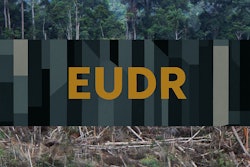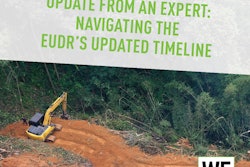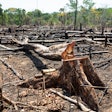Recently I was working with a U.S. company on what I call "green tape"-the various certifications and environmental issues I need to cover with suppliers such as CARB and other formaldehyde or chemical issues, FSC and other certification issues, Lacey and other legality issues, etc. I asked about their Lacey procedures and the response came back: "The wood chips are from forests locally in the U.S. I do not believe that the Lacey Act applies here."
This is a common misconception among both producers and buyers that Lacey somehow doesn't apply to U.S. wood production. It absolutely does. And there actually is illegal logging taking place in the U.S.-often by accident, but sometimes deliberately. U.S. companies need to ensure that all their supply, not just imports, is legally harvested.
A Congressional study found that:
"Illegal logging exists in the United States but is primarily done by individuals or small operations. Some report that up to 10% of forest production in the U.S. is illegal. The U.S. Forest Service estimates that approximately one out of every 10 trees harvested in national forests is taken illegally. Private lumber companies estimate that nearly 3% of their cut trees are stolen, amounting to losses of approximately $350 million annually. Statistics for illegal logging on private lands are unavailable, yet are anecdotally quoted as a serious problem."
Just as with an import, if the U.S. government can prove that material in a domestic mill's supply chain is illegally sourced (or there has been a violation of another related law associated with it), then the mill can be prosecuted under Lacey.
Wikipedia references a U.S. Forest Service report stating that "the biggest issue facing deforestation in the United States is illegal logging in forests." It notes that "illegal logging is the biggest problem with deforestation because it is nearly impossible to monitor and stop…(it) often happens when companies disregard their permits and go beyond what they are allowed to harvest."
That raises an interesting question-what happens when companies (deliberately or accidentally) cut more than they were supposed to. A very useful and interesting study by the state of Indiana found that most illegal logging there could be resolved without law enforcement:
"99.96% of the timber removed in Indiana was legally acquired, harvested, and processed. A large percentage of the cases that fall within the wrongfully cut category are often accidental problems that are settled between parties not requiring law enforcement action or the Division of Forestry's (DoF) intervention."
However, Lacey is unclear regarding the state of the wood in this case. Lacey is very specific that if the wood is illegal, it's illegal. Can it become un-illegal?
Let's say the logger accidentally crossed a property line and illegally harvested trees on another property. The mistake is discovered and the two owners and the logger come to an agreement that settles the matter to their mutual satisfaction. Is the wood still illegal? It was harvested illegally originally-can it be "reverted" to legal somehow?
What if the property line was in dispute-did he fail in due diligence because he didn't independently determine exactly where the line really was? Maybe he didn't even know there was a dispute-again, was that a failure in due diligence? He surely entered the contract with the landowner for harvest in good faith and followed the guides given-is he guilty if he crossed a border that wasn't where he was told it was?
And how much should intent play a role in evaluating a Lacey violation? If the logger had absolutely no intent of stealing the tree, should he be punished under Lacey? Right now, ignorance of the law (or the property line) and innocence in terms of intent mean nothing under Lacey. Right now, it seems that the logger is guilty and the wood is illegal and there's no clear way to change that.
Now consider also a violation that is resolved through law enforcement action-for example cutting too close to the watershed. In most cases, the logger is fined but he keeps the wood. The wood was illegally harvested initially-does the fact that law enforcement has penalized the logger mean that they've now sanitized the wood and it's legal again?
The Department of Justice, when asked about Lacey prosecutions, say that they'll study each case independently; that they'll evaluate the due diligence practices of the offender and their level of professional knowledge as well as the type of violation in determining how they would prosecute and what penalties they would seek. But at the moment, all violations, in and out of the U.S., are absolute.
































